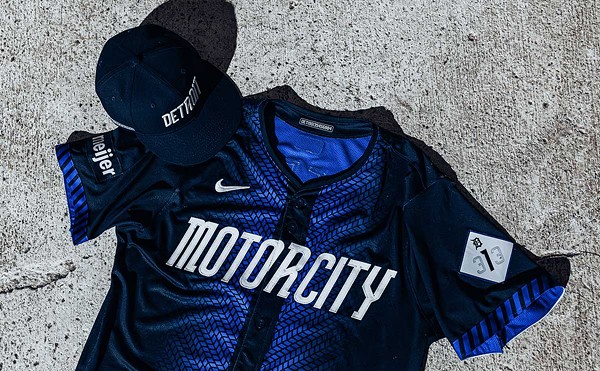In the depths of the Whorehouse on Detroit’s West Side, gnarly rhetoric and grimy bass lines feed a vibration that can be felt a block away. Inside: two speakers, overflowing ashtrays, half-full liquor bottles, Tupac-adorned walls, an Apple computer burping up music, an ancient dinette set and a thousand-dollar mic. PayPaBoiz rappers Boo Boo Breed (cousin of MC Breed), Arcane, Young Hoop, E-Jay and GetPayPer management team administrator Larry Simons are all spread out, freestyling, comparing lyrics and, of course, talking shit.
The Whorehouse is the recording studio of Fallen Angelz Entertainment, a local company that oversees GetPayPer and two record labels headed by Russell Culvin, who sits nearby.
“Man, everybody has been through here lately. Gangsta Pat, Boss, MC Breed, Esham have all recorded joints up in here,” the 28-year-old Culvin says. “They all know that anything coming out the Whorehouse is going to be da shit.”
Culvin, E-Jay, Arcane and Simons move to an upstairs den to talk Fallen Angelz, Dice and PayPaBoiz. The three seat themselves on a long black leather couch while Culvin stands nearby. The room is dark like their music.
At 6-foot-4-inches, 235 pounds, sporting black jeans and a white T-shirt, Culvin is imposing. He could be the guy who hassles you at airport security. Yet he’s the guy behind a label that’s quietly acquiring a healthy percentage of local acid rapper Esham’s faithful followers.
Fallen Angelz is the lifelong dream of Culvin, the go-getter who founded the label in 1999 by mortgaging his mother’s house for the startup costs. He cites Detroit cult icon Esham —whose coarse rap command influenced a generation of Detroit hip hop, from Insane Clown Posse to Kid Rock — as inspiration.
“It’s never bothered me that people compare us [to Esham], because I copied the acid look, but added my own flavor of East [Coast], West [Coast] and Detroit sound,” says Culvin. “I call it wick music. I grew up admiring Esham; he was like Michigan’s version of Eazy-E. He was independent but had a big fan base. But it was when I hooked up [producer] Lord Maja, [rapper] Razak, DJ Lenn Swann and [rapper] Dice that it hit the next level.”
Dice was a proven vet with a large following when he hooked up with Culvin. Dice had released his debut The 40 Made Me Do It on local Rawdogg Records (the same label that housed duo Chaos and Mystro) and his second, Theneighborhoodshittalka, on Esham’s Reel Life Productions. He was Snoop to Culvin’s Dr. Dre.
Dice had come to Culvin looking for a record deal.
“He fell out with Esham over a money situation, and I signed him and his boy Razak,” explains Culvin. “We were constantly recording. We all lived in the studio and by early 2000 we dropped Dice’s Black Monday album.”
With a heavy dose of urban realism and a ton of kick-ass bass-heavy beats, Black Monday became the cornerstone of the Fallen Angelz.
But there were problems. Culvin had his key artist Dice and a solid production team, but no distributor for the label. Needing a way to get his goods beyond Michigan, Culvin did it himself. He gassed up his 1998 Suburban, grabbed Dice and Razak, packed up 7,000 CDs and hit the road.
“We hit Ohio, Kentucky, Florida, Arizona, Texas, Georgia, Chicago, and Indiana just dropping units off on consignment, fuck a distributor. Sometimes I would even throw the record store a hundred dollars just to keep our posters up a few more months,” he says.
Within nine months the DIY hustle began to pay off and Black Monday sold a respectable 6,000 copies.
But Dice’s pockets were empty and he wasn’t happy. He bailed on the project in early 2001, taking Razak with him. Culvin says the cost of manufacturing, distributing and promoting Black Monday meant that he still hadn’t broken even, a business fact that he says was lost on Dice.
“Dice had the same problem with Fallen Angelz as he did with Reel Life; he didn’t understand the word recoup. Dice saw the money coming in, but he didn’t understand we had to pay for stickers, posters, fliers and videos. He left with four shows he was supposed to perform at and owing me three more albums.”
To add insult to injury, Culvin, who’s technically not a performer, got on stage and did Dice’s parts for those remaining dates on the tour that Dice quit. “I knew all of Dice’s lines, so I did the four shows with a hoodie on and acted like I was Dice.”
Hence the street-buzzed beef between Dice and Fallen Angelz Entertainment.
Dice has his side of the story too, but doesn’t want to go into detail. He says in a separate interview that “Russell Culvin Jr. is a habitual liar. I was down for the fullest; it wasn’t about money, ’cause he knows what really happened.”
“Dice didn’t want to work,” Culvin says flatly. “One time he wanted us to pay him for doing his own record signing!”
Dice: “He’s trying to destroy a brother’s career, so you can tell him to stop calling me ’cause they on some bullshit, they ain’t about business and I ain’t getting back with Fallen Angelz.” (Dice, by the way, has a new record coming out this Halloween on his own Big Head record label.)
The way Culvin tells it, Dice still owed Fallen Angelz three records when he quit. At one point Culvin released Red Rain, an album of Dice material recorded just after the Black Monday sessions. Dice had — with notoriety from Black Monday and a quality catalog — solidified a prominent place in the underground hip-hop world. Culvin knew he could exploit that.
Momentum for Black Monday was building after Dice’s exit; the record sold, Culvin reckons, another 14,000 units. As for the feud, the two are not talking. Culvin says he hasn’t talked to Dice in three years.
With their raunchy street rhetoric and subtle satanic references over wicked synthesized beats, Fallen Anglez’s “wick” music is far from the self-serving gloss that’s the face of today’s hip hop. What’s more, gaining acceptance in Detroit hip hop isn’t easy for anybody, quarreling or not. For the folk of Fallen Angelz, breaking in the Motor City has been tough.
“It’s a lot of hating going on in Detroit,” says Arcane, who sports a facial expression more stoic than an O.J. Simpson mug shot. “No one wants to support you unless you are bling-blinging.”
“Most of our local shows have been in Battle Creek, Clawson, Pontiac and Kalamazoo,” interjects Culvin. “But I knew all that all along. It’s hard getting respect in Detroit: Look how long it took Slum Village?”
So with his star player gone, Culvin decided to cultivate a team of emcees. In 2003 he released the E.A.R.T.H. album (Evil Angels Running Thru Hell), which included rappers Arcane and J-neato. That project went south when J-neato got locked up on an assault charge.
So Culvin created the PayPaBoiz with Boo Boo Breed, Arcane, E-Jay and Young Hoop. Culvin is banking on the ’Boiz to be a major phase for Fallen Angelz.
With a tongue sharper than a guillotine, Arcane is a lyrical slasher while Boo Boo Breed’s flow is more subdued. Young Hoop is like a sixth man off the bench who gets in where he fits. The PayPaBoiz mix disc Street News hits the bins in early October, the debut album, January 2005.
If the debut PayPaBoiz vid (“Gimmie What You Got”) is any sign, then the quartet will at least have club hits. The song also features cameos from Death Row fugitive Kurrupt and Flint legend MC Breed.
Working with MC Breed led to another move for Culvin. “Breed liked our production and the way we did business, so me and Larry [Simons] decided to start GetPayPer Management to manage him.”
GetPayPer is an administrative/management arm under the Fallen Angelz umbrella, set up to guide hip-hop artists’ careers and protect them from the nooses of the rap game.
“We just wanted to work with more young artists to show them how to get paid,” says Simons.
“You can’t put all your eggs in one basket,” Culvin adds, finally taking a seat.
Culvin is pleased by the moderate success of his underground hip-hop company. It has allowed him to employ six people and take care of his family. The large man is content but not satisfied — he won’t be until his artists go international.
“I just concentrate on production and getting my artists past Michigan lines,” he says. “And I ain’t worked in three years, and I’ve been able to take care of my mamma. Cats just can’t be afraid to hustle.”
Kahn Davison is a freelance urban music writer in Detroit. Contact him at [email protected]





